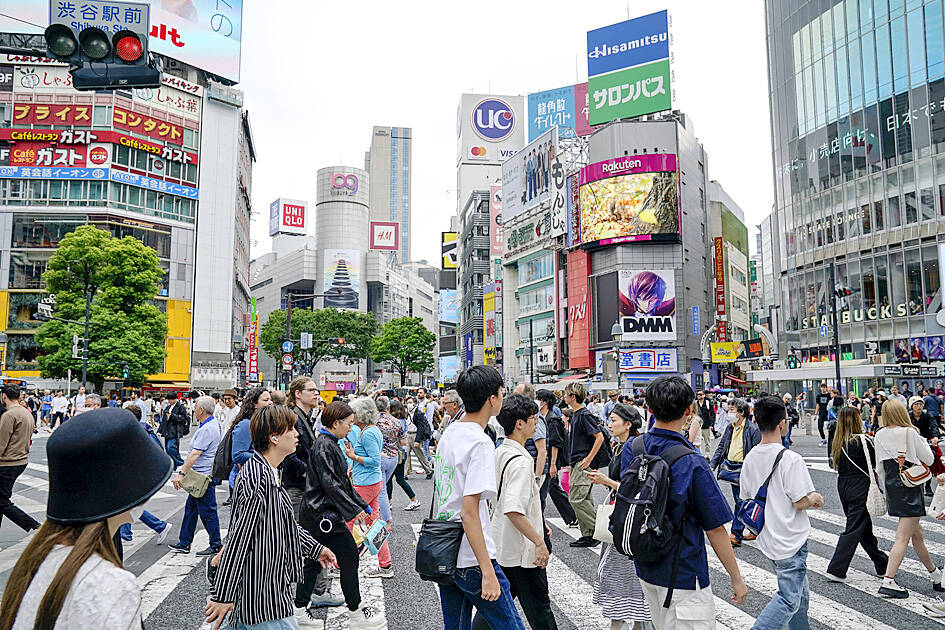Japan’s economy showed scant signs of a recovery with a narrower-than-estimated contraction, leaving plenty of reason for continued caution among policymakers, as the Bank of Japan (BOJ) eyes the timing of its next interest rate hike.
GDP shrank at an annual pace of 1.8 percent in the three months through March compared with a 2 percent retreat reported in preliminary data, the Japan’s Cabinet Office said yesterday.
Economists had forecast the updated figures would be unchanged.

Photo: EPA-EFE
Consumers and companies are cutting back on spending, and unsold supplies are building up on warehouse shelves, as the inflation trend continues to crimp outlays in real terms, data showed.
“The data confirmed weakness in consumption. A breakdown shows spending on durable goods was weak, which I think reflected the impact of the Daihatsu problem on auto purchases,” Daiwa Securities economist Toru Suehiro said. “The BOJ doesn’t have a choice but to be cautious about the economy.”
Personal consumption data were left unchanged at minus-0.7 percent, marking a fourth quarter of decline, while business spending figures were revised to minus-0.4 percent from a preliminary decline of 0.8 percent.
Inventories added 0.3 percentage points to growth, while net exports were tweaked to reflect a slightly larger drag on the economy.
A rebound in growth in the current quarter is widely expected, as the economy recovers from the effects of one-off factors, including a New Year’s Day earthquake northwest of Tokyo.
An auto production halt due to a certification scandal also weighed on growth. While output has since been restored, a fresh scandal might exert a drag on the current quarter.
Among risks to the outlook, households are set to see a rise in utility costs, as the government phases out subsidies.
Meanwhile, workers have seen declines in real wages for more than two years, while retirees on fixed income have been hit even harder, as they cope with inflation at or above the BOJ’s 2 percent target.
Higher costs for imports due to the yen’s slump might further lift food and energy prices.
Still, analysts expect real wages adjusted for inflation to turn positive in coming months after annual wage talks resulted in pledges by large companies to lift pay by more than 5 percent.
The weak yen also has some positive effects for the economy, boosting corporate earnings abroad and inbound tourism.
The BOJ is likely to discuss the reduction of its government bond purchases as early as this week, as it continues to normalize its policy following its historic interest rate hike in March, people familiar with the matter said.
Economists expect the central bank to hold its benchmark policy rate steady at a two-day meeting concluding on Friday, with many predicting a hike by October.

When an apartment comes up for rent in Germany’s big cities, hundreds of prospective tenants often queue down the street to view it, but the acute shortage of affordable housing is getting scant attention ahead of today’s snap general election. “Housing is one of the main problems for people, but nobody talks about it, nobody takes it seriously,” said Andreas Ibel, president of Build Europe, an association representing housing developers. Migration and the sluggish economy top the list of voters’ concerns, but analysts say housing policy fails to break through as returns on investment take time to register, making the

EARLY TALKS: Measures under consideration include convincing allies to match US curbs, further restricting exports of AI chips or GPUs, and blocking Chinese investments US President Donald Trump’s administration is sketching out tougher versions of US semiconductor curbs and pressuring key allies to escalate their restrictions on China’s chip industry, an early indication the new US president plans to expand efforts that began under former US president Joe Biden to limit Beijing’s technological prowess. Trump officials recently met with their Japanese and Dutch counterparts about restricting Tokyo Electron Ltd and ASML Holding NV engineers from maintaining semiconductor gear in China, people familiar with the matter said. The aim, which was also a priority for Biden, is to see key allies match China curbs the US

NOT TO WORRY: Some people are concerned funds might continue moving out of the country, but the central bank said financial account outflows are not unusual in Taiwan Taiwan’s outbound investments hit a new high last year due to investments made by contract chipmaker Taiwan Semiconductor Manufacturing Co (TSMC, 台積電) and other major manufacturers to boost global expansion, the central bank said on Thursday. The net increase in outbound investments last year reached a record US$21.05 billion, while the net increase in outbound investments by Taiwanese residents reached a record US$31.98 billion, central bank data showed. Chen Fei-wen (陳斐紋), deputy director of the central bank’s Department of Economic Research, said the increase was largely due to TSMC’s efforts to expand production in the US and Japan. Investments by Vanguard International

STRUGGLING TO SURVIVE: The group is proposing a consortium of investors, with Tesla as the largest backer, and possibly a minority investment by Hon Hai Precision Nissan Motor Co shares jumped after the Financial Times reported that a high-level Japanese group has drawn up plans to seek investment from Elon Musk’s Tesla Inc to aid the struggling automaker. The group believes the electric vehicle (EV) maker is interested in acquiring Nissan’s plants in the US, the newspaper reported, citing people it did not identify. The proposal envisions a consortium of investors, with Tesla as the largest backer, but also includes the possibility of a minority investment by Hon Hai Precision Industry Co (鴻海精密) to prevent a full takeover by the Apple supplier, the report said. The group is